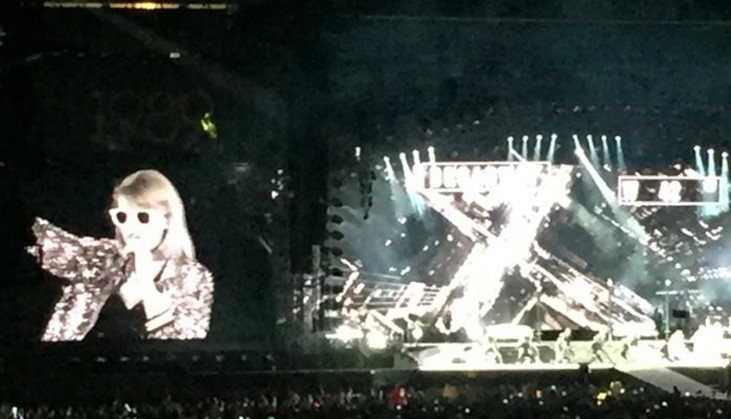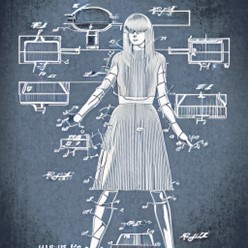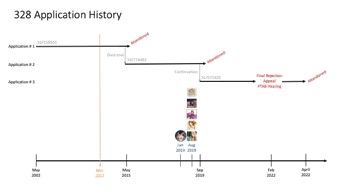
INNOVATE Magazine
INNOVATE is the online magazine by and for AIPLA members from IP law students all the way through retired practitioners. Designed as an online publication, INNOVATE features magazine-like articles on a wide variety of topics in IP law.
The views and opinions expressed in these articles are those of the authors and do not necessarily reflect the views or positions of AIPLA.
Articles
In This Section
Patenting Taylor Swift
Tom Waters

Taylor Swift in Concert in Tampa, FL (2015) (Picture courtesy of the author.)
INTRODUCTION
Taylor Swift had a good year in 2022. She dropped a new album and completely took over Billboard’s Top Ten list, the first artist in history to do so.[1] She followed that by announcing a new world tour for 2023, the first in five years, (though Ticketmaster bungled the ticket sales).[2] Still, a very good year.
So good, she was almost patented.
THE APPLICATION(S)
I know, you can’t actually patent a person.[3] And other music artists have filed patent applications. Eddie Van Halen. Paula Abdul. Prince. Kanye West. But those artists filed patents themselves. Ms. Swift may have been the unwitting muse for one.
Last February, the U.S. Patent and Trademark Office rejected the single claim for a patent application - 16/574,328[4] - filed by David Pullman. For simplicity's sake, let’s call it the ‘328 Application.
David Pullman is a familiar name in the music industry. He is currently suing Ed Sheeran for copyright infringement, alleging that ‘Thinking Out Loud’ is a little too similar to Marvin Gaye’s ‘Let’s Get It On.’ A judge decided the case was too nuanced for him to resolve and referred it to a jury trial.[5] (A judge dismissed Pullman’s suit[6], while a second filed by songwriter Ed Townsend’s heirs was ruled in Sheeran’s favor in early May, 2022.[7])
Back in the late 1990’s, David Pullman made headlines with the so-called Bowie Bonds.[8] Music legend David Bowie wanted an immediate payday on the future royalties from his catalog of twenty-five albums. The portfolio included some of his most famous work – The Man Who Sold The World, Heroes, and the iconic Ziggy Stardust. Pullman securitized Bowie’s future royalties with a bond instrument that was purchased by Prudential Insurance. These came to be known as Bowie Bonds.
Bowie received a lump sum payment of $50MIL. Pullman went on to provide similar products for other artists including James Brown, the Isley Brothers, and Marvin Gaye.[9] Competitors quickly followed, creating bond products for artists as varied as Iron Maiden, Dusty Springfield, and Rod Stewart.
Pullman later sued Bowie’s manager, Prudential, and others claiming he invented the Bowie Bond. When the case was dismissed, Pullman appealed. In a unanimous decision the New York State Supreme Court upheld the dismissal, saying Pullman neither “...developed or ever owned this alleged intellectual property."[10] The U.S. Trademark office refused to sanction his use of a trademark on the Bowie Bond[11] and their database lists the trademark as abandoned.
‘What does this have to do with Taylor Swift’ you ask? I’m getting to that.
In 2002, David Pullman applied for a patent on securitizing music portfolios, listing twenty-two individual claims. With these other legal actions going on simultaneously, this application languished in patent purgatory for thirteen years.[12] In May of 2015, when his claims were rejected by the patent office, he abandoned the application, but not before filing a Divisional.
Divisional application 14/714,482 cleaved off a piece of the original 2002 filing.[13] This is common when there is more than one patentable invention in an application. Sometimes the patent office will ask (or require) an inventor to file a Divisional for the secondary invention. Sometimes the inventor does so on their own.
The ‘482’s claims were also rejected by the examiners. Pullman abandoned this application as well, but not before filing a Continuation.
A Continuation is essentially the description and drawings filed previously, but can have claims seeking a different scope, (though not adding new claims). The claims can be narrowed, or perhaps pursue a different strategy than before, using what the inventor has learned about the patent examiner’s position. Continuations also allow an application to adjust to advances in technology that have taken place since the original filing.[14] Pullman’s Continuation was this ‘328 application filed in September 2019 with a single claim.
Here’s where Ms. Swift may have played a part.
In June of 2019 her record company was sold and she was not invited to buy back her master recordings. Her album catalog accounted for nearly half of Big Machine Records’ alleged value in the $300MIL sale and she was reportedly upset about not having an opportunity to get her masters back.[15]
In July she vented publicly about the situation, but in August she took action privately, with plans to rerecord her masters, even adding a few new tunes as a bonus.[16] Anyone wanting to play songs from those albums in the future would have to use her newly released versions. This functionally left the original masters in the dust bin of copyright history. Here’s where things get interesting.
David Pullman filed his ‘328 Continuation in September 2019, mere weeks after Ms. Swift announced she would rerecord her original works. A coincidence perhaps, filing so soon after Taylor’s public declaration, but also an opportunity. That there was only a single claim, is not particularly interesting.[17] That it was using a twenty-year-old filing date, however, is.
THE LAW(S)
Back in 2011 the America Invents Act (AIA) transitioned the United States to a First-to-File approach, the system already in use by most of the world. Prior to this we used a First-to-Invent approach. If you could prove you invented something before another party – using anything from lab notes to published articles to backdate your work – you were almost certain to receive the issued patent.
The AIA’s First-to-File change makes it a race to the patent office. If you file first, getting a date and time stamp ahead of a competitor, you are going to be issued the patent for that invention. The change took effect in March of 2013 with an important caveat: Any application still pending on that transition day is grandfathered in, retaining the old First-to-Invent rules.
Pullman’s ‘328 Continuation stemmed from the ‘482 Divisional that cites the original application filed in May of 2002. That would date the application prior to all of Taylor Swift’s first five albums. No, copyright law is not the same as patent law, but think about the other artists who might be watching Taylor’s actions and want to rerecord their works too. Way back in 2002, Jonathan Cain, the longtime keyboard player for Journey, put it succinctly: "Music is certain, even in uncertain times." [18]

THE TRIAL
The Patent Office rejected the ‘328 Continuation claim. Pullman appealed and requested a hearing before the Patent Trial and Appeals Board, which he received. The patent office does not provide audio recordings of oral arguments, but they do provide written transcripts.[19]
Judge Anton Fetting stated the examiner’s prior art rejection. In his rebuttal, David Pullman argued that back in 2002 “... the record masters, the artist royalties, the writer’s share, ... what if you had no income stream at all from that? How do you have a minimum when there is no income stream?”
Pullman argued the prior art required there be a revenue stream and that the absence of such a stream was enough to distinguish his concept as novel based on all of these changes to the industry happening now, twenty years later.
Was David Pullman thinking about other artists rerecording their masters as a potential opportunity? I don’t know, but why else use a twenty-year-old filing date? My guess is he wanted to block all those potential copycat investors he’d had to contend with before. With a Continuation he alone could retain the old set of rules, something no one else could.
After listening to arguments, the three judge Patent Trial and Appeals Board upheld the examiner’s rejection, effectively cutting off the 2013 lifeline. There would be no patent – at least, not one with a 2002 filing date. The patent office declared the ‘328 application officially Abandoned on July 1, 2022 when no follow up action was filed after the Board’s decision.[20]
According to Capital FM, Taylor Swift’s sixth album, Reputation, exited its contractual restriction in November 2022, freeing her to rerecord that work as well. With that she would own her entire music catalog.[21]
New record contracts have themselves been remastered to prevent other artists from following in Taylor’s intellectual property footsteps, severely limiting any new market opportunity had the ‘328 Continuation been approved.
And the music plays on...

SOURCES
[1] Gary Trust. ‘Taylor Swift Makes History as First Artist With Entire Top 10 on Billboard Hot 100, Led by ‘Anti-Hero’ at No. 1’, BILLBOARD MAGAZINE. October 31, 2022.
https://www.billboard.com/music/chart-beat/taylor-swift-all-hot-100-top-10-anti-hero-1235163664/
[2] GMA Team. ‘Taylor Swift breaks silence on Ticketmaster drama for Eras Tour’, ABC NEWS. November 18, 2022. https://abcnews.go.com/GMA/Culture/taylor-swift-breaks-silence-ticketmaster-drama-eras-tour/story?id=93558651
[3] Eliot Marshall and Michael Price. ‘U.S. Supreme Court Strikes Down Human Gene Patents’. SCIENCE. June 3, 2013. https://www.science.org/content/article/us-supreme-court-strikes-down-human-gene-patents?cookieSet=1
[4] https://patents.google.com/patent/US20200013129A1/en?oq=16%2f574328
[5] Devon Forward. ‘Ed Sheeran Facing $100 Million Lawsuit For ‘Thinking Out Loud’, MSN. October 2, 2022.
https://www.msn.com/en-us/music/news/ed-sheeran-facing-100-million-lawsuit-for-thinking-out-loud/ar-AA12w1im?li=BBnb2gh
[6] Sakellariou, Alexandra. ‘Ed Sheeran Just Won A Second Million-Dollar Copyright Lawsuit’, THE RICHEST. May 18, 2023. https://www.therichest.com/rich-powerful/ed-sheeran-just-won-a-second-million-dollar-copyright-lawsuit/
[7] Bloom, Madison. ‘Ed Sheeran Wins Another “Thinking Out Loud” Copyright Lawsuit’, PITCHFORK. May 17, 2023.
https://pitchfork.com/news/ed-sheeran-wins-another-thinking-out-loud-copyright-lawsuit/
[8] Landon Thomas Jr. ‘Ziggy Gold Dust: David Pullman Made a Fortune on Bowie Bonds; Roll Over Marvin Gaye!’, THE OBSERVER. November 20, 2000. https://observer.com/2000/11/ziggy-gold-dust-david-pullman-made-a-fortune-on-bowie-bonds-roll-over-marvin-gaye/
[9] Jamie Doward. ‘He Feels Good - And Thinks They Should’, THE GUARDIAN. June 2, 2001.
https://www.theguardian.com/business/2001/jun/03/theobserver.observerbusiness10
[10] ‘Pullman Group Loses Bowie Bond Case’. Celebrity Access.
https://celebrityaccess.com/caarchive/pullman-group-loses-bowie-bond-case/
[11] Landon Thomas Jr. ‘Ziggy Gold Dust: David Pullman Made a Fortune on Bowie Bonds’. The Observer. November 20, 2000.
https://observer.com/2000/11/ziggy-gold-dust-david-pullman-made-a-fortune-on-bowie-bonds-roll-over-marvin-gaye/
[12] https://patents.google.com/patent/US20030225653A1/en?oq=10%2f159%2c344
[13] https://patents.google.com/patent/US20150248738A1/en?oq=14%2f714482+
[14] https://www.neustel.com/patents/patent-applications/continuation-patent-applications-reasons-file/
[15] Shirley Halperin. ‘Scooter Braun Sells Taylor Swift’s Big Machine Masters for Big Payday’. VAREIETY. Nov 16, 2020. https://variety.com/2020/music/news/scooter-braun-sells-taylor-swift-big-machine-masters-1234832080/
[16] Kyle Kim. ‘We Compared ‘Taylor’s Version’ Songs With the Original Taylor Swift Albums, THE WALL STREET JOURNAL. November 12, 2021. https://www.wsj.com/articles/we-compared-taylors-version-songs-with-the-original-taylor-swift-albums-11636383601?wsj_native_webview=ipad&ace_config=%7B%22wsj%22:%7B%22djcmp%22:%7B%22propertyHref%22:%22https://wsj.ios.app%22%7D%7D%7D&ns=prod/accounts-wsj
[17] “A Method for Creating A Pool of Intellectual Property Assets for Securitization Comprising the Steps of...”
https://patentimages.storage.googleapis.com/d6/25/16/e14aea1709f254/US20200013129A1.pdf
[18] Gary Graff. ‘Why Music Artists Are Selling Their Catalog Rights’. LOUDWIRE. December 7, 2002. https://loudwire.com/why-music-artists-selling-catalog-rights/
[19] https://patentcenter.uspto.gov/applications/16574328/ifw/docs
[20] https://patentcenter.uspto.gov/applications/16574328/ifw/docs
[21] Britany Spanos. ‘Can Taylor Swift Re-Record Her Old Albums? Should She?’ ROLLING STONE. August 22, 2019. https://www.rollingstone.com/pro/news/can-taylor-swift-re-record-her-old-albums-should-she-875296/
Innovate Volume 20 Timeline
submit articles to innovate@aipla.org
Submission Window Open
January 2, 2026
Submission Deadline
April 10, 2026
Publication Date
June 12, 2026
About
Publishing an article to INNOVATE is a great way for AIPLA members to build their brand by increasing recognition among peers and setting themselves apart as thought leaders in the IP industry.
Any current AIPLA member in good standing may submit an article for consideration in INNOVATE throughout the year. IP law students are especially encouraged to submit articles for publication.
Articles submitted to innovate@aipla.org are reviewed by an ad-hoc sub-committee of volunteers from AIPLA's Fellows Committee, and other AIPLA peers.
Don’t miss your chance to be published with AIPLA’s INNOVATE! Email your article submission to innovate@aipla.org to be considered for the next edition.
For more information please review the Guidelines for INNOVATE Article Submission and the INNOVATE Author Acknowledgement Letter for guidelines and terms of article submission and publication.
